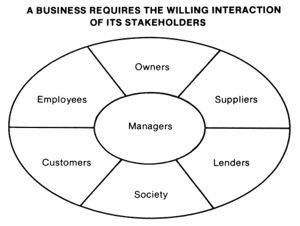The Origins of the “Stakeholder” concept
- philip79952
- Sep 20, 2013
- 3 min read
The Origins of the “Stakeholder”
In the early 60’s a working party was assembled by Stanford Research Institute (SRI) in California. They were tasked to examine the nature of Team working, problem analysis and the structure of decision making.
From all this work many novel concepts arose and one interesting one was the notion of “stakeholders”.
Though in common use today as loosely describing all those parties who have a critical interest in the operation and success of any enterprise, it was first formulated by SRI in about 1963.
Since then the concept has grown to such global acceptance that there are now formal theories and international conferences on the concept of stakeholders. Many, including economist Milton Friedman, have said that the only purpose of a company is to make profit for its shareholders; that is, the shareholders are the only stakeholder group to which managers are accountable.
SRI’s viewpoint, expressed years earlier, was that a corporation is beholding to more than just its shareholders and defined stakeholders as:
According to Bill Royce, the first printed use of “stakeholders” in a business sense appeared in LRPS Report No. 168 titled “The Strategic Plan” dated April 1963.
In the preparation of that report Robert Stewart, Knight Allen, and Marion Doscher were discussing who should have influence on a corporate purpose.
Doscher defined them as “stakeholders”, to her an old Scottish term meaning those with a legitimate claim on something of value. Actually, its semantics go something like this: stakeholder is literally the holder of a wager but stake is also short for grubstake, an early U.S. Western term meaning an advance given to a prospector in expectation of a share in his finds.
It thus conveys a natural interest in an enterprise. Regardless, it caught on and was used extensively thereafter. An affirmation of its SRI origins can be found in a paper on business ethics by Johanna Kujala and in Igor Ansoff’s book, Corporate Strategy, McGraw-Hill 1965, p34.
An example is the Stakeholder Theory Conference, University of Toronto, May, 1996.
Friedman, M. , The Social Responsibility of Business Is to Increase Profits, New York Times Magazine, Sep 13, 1970, pp 122-126. As quoted in Freeman, R. Edward, Strategic Management: A Stakeholder Approach, Pitman, Boston, 1984. Freeman is particularly known for his work on stakeholder theory originally published in his 1984 book Strategic Management: A Stakeholder Approach. Also recently he co-edited standard business textbooks; The Portable MBA and the Blackwell’s Handbook of Strategic Management, and his latest book, Managing for Stakeholders, was published by on October 17, 2007.
A Stakeholder in an Organisation is defined as; any group or individual who can affect or is affected by the achievement of the Organisations objectives.
That very broad definition originally included the groups shown in a 1965 briefing slide:
the share owners employees customers suppliers lenders the society

Many academics have created their own version of the concept by adding such stakeholders as the environment and competitors.
In any case today’s climate for business is clearly more represented by the SRI definition than any narrow construct such as just shareholders. Though shareholders are still perhaps the most important stakeholder for managers to be successful today, they must place a broader gauge on their decisions.
SRI went on to develop methods for defining, analysing, and showing the cross-impacts created by the expectations of the various stakeholders.
Additional work conducted by this team included the authoring of the SWOT analysis (formerly called SOFT) and the creation of Team Action Management (TAM) as a means to accelerate business development and manage change.
Interested in the origin of the SWOT analysis or Team Action Management? Need help to bring your Business Planning and Stakeholders together?
Drop me an email at Philip@tamplc.com



Comments